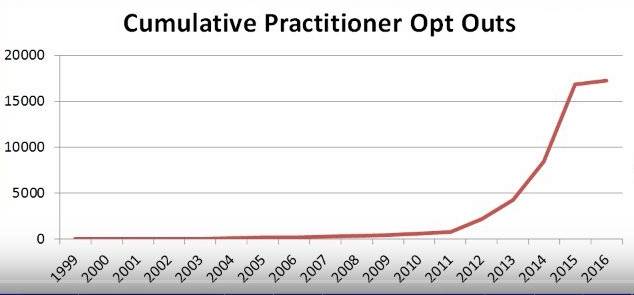As an increasing number of physicians and practices follow a Medicare opt out model, many who haven’t opted out yet are curious. Will opting out mean more money or less? More headaches or fewer?
Below, we’ve collected facts and statements from doctors who have already opted out of Medicare and switched to a cash/credit-based business model. We’ve provided 20 reasons to move to a Direct Patient Care situation, including improvements in money, joy, stress, and other big metrics cited by proponents.
What is the Medicare Opt Out Model?
More and more physicians are choosing to opt out of Medicare. But what exactly does that mean? We spoke with Jane Orient, MD, Executive Director of the Association of American Physicians and Surgeons (AAPS).
“Well what more and more doctors are doing is, they’re getting off the third party government treadmill,” says Orient. “They’re going into medical practice the way it used to be. Some are in a fee-for-service practice that doesn’t sign contracts with either Medicare or insurance companies. Some are in the Direct Patient Care (DPC) subscription model. Doctors who do this are finding that the joy of practicing medicine is restored.”
Why Are More Doctors Opting Out of Medicare?
There are several reasons doctors opt out of Medicare. The biggest are less stress, less risk of regulation and litigation trouble, more time with patients, more free time for themselves, greater efficiency, and ultimately, higher take home pay.
“Opt out doctors love their patients, and their patients reciprocate that,” says Dr. Orient. “The administrative hassles are much decreased, so while the doctors may be bringing in less revenue, in total they may be taking home more because they don’t have all the coding and claims filing and other types of documenting and requirements.”
All these benefits to the opt out Medicare practice stem largely from removing the obtrusive third parties of insurance and government from the equation.
“The doctor has more time to spend with the patient,” says Dr. Orient. “He’s keeping things private. He’s not turning over records to the insurance companies. The patient doesn’t have this intrusion into the doctor/patient relationship, and the doctors are happier. The patients are happier.”
20 Reasons to Opt Out of Medicare
Here’s a list of 20 reasons to opt out of Medicare, reported by physicians who have already made the switch. The benefits include more money, more time with patients, less overall work, less stress, and a return to the joy of practicing medicine.
Physicians who opt out claim they’re happier, their patients are happier, there’s more doctor/patient trust, and even increased patient compliance. Doctors who opt out also see less burnout and less risk of litigation and regulatory entanglements. Without further preamble, here’s the list:
1. You Won’t Be Alone
Over 17,000 doctors nationwide have chosen to opt out of Medicare. While that’s only about 5% of the total in private practice, the number of Medicare opt out practices has grown exponentially since 2012. With this change comes more and better resources, more support, and a higher rate of confidence that getting off the Medicare treadmill is actually feasible.

2. More Time to Spend with Each Patient
It’s estimated that on average, physicians spend about 8 minutes with each patient. That destroys doctor/patient trust, but it doesn’t mean doctors are seeing 60 patients per day (a patient every 8 minutes or 7.5 patients per hour for 8 hours). Instead, only 27% of a doctor’s time is spent giving direct care. In a Medicare opt out scenario, paperwork and other hassles are greatly reduced, which means a doctor can now spend 30 minutes or more with each patient and still earn more money.
More time with the patient means higher levels of reported patient trust and satisfaction. As Dr. Lawrence Huntoon put it in a 2017 presentation to the AAPS, “Patients like that. They don’t necessarily want to talk to a PA or an NP or the secretary sitting at the front desk. They’d rather see an actual, real live physician.”
3. The Doctors Are Happier
Doctors in the traditional Medicare or insurance-based model are overworked and pulled in different directions. On the one hand they’d like to provide the best care to their patients. On the other, they’re forced to select treatments and therapies that may not be in the patient’s best interest. So what’s the biggest reason to opt out of Medicare?
“The freedom and pleasure of practicing medicine again,” says Dr. Huntoon. “Who went into medicine to practice bureaucracy?”
4. Less Risk of Burnout
Physician burnout jumped 10% in just the past three years, with rates from 37% in dermatology all the way up to 60% for critical care doctors. That’s according to a 2017 Medscape survey. Doctors who opt out of Medicare report higher job satisfaction rates and less burnout than their Medicare and insurance-based counterparts.
5. Better Patient Care

When a doctor opts out of Medicare, the focus shifts away from billing, codes, claims, compliance, and administrative tasks and back to healing the patient, where it should be. The practice becomes patient-centric again rather than insurance-centric. Everything in the business reorients toward achieving success for the patient, which naturally makes the practice more successful as well.
6. The Patients Are Happier
Patients tend to like the increased time, attention, passion, and patient-oriented drive of a practice that has opted out of Medicare.
“When they call on the phone the question is, “How can we help you?” and not, “What’s your insurance?” says Dr. Orient of the AAPS. “When they come into the office, they’re not greeted by an army of clerks filling out paperwork, trying to figure out how they’re going to get paid.”
7. Higher Doctor/Patient Trust
The hassles and restrictions of the Medicare-based medical practice can make a doctor overworked and underpaid. It can also lead to billing frustrations and care that the physician knows isn’t in the patient’s best interest. That’s a setup for conflict and distrust. By contrast, the Medicare opt out practice boosts doctor/patient trust via more time spent with the patient, better patient privacy controls, more passionate, engaged physicians, and an overall better standard of care.
Want to increase trust in your practice? See our article on ways to increase doctor/patient trust.
8. Increased Patient Compliance
Patients who are treated like cattle, made to wait for hours and then rushed through treatment are much more likely to resist a doctor’s advice. A patient handled with engagement by a doctor who’s passionate about making her well again will conversely be much more apt to follow doctor’s orders.
9. See Less Patients
The Medicare opt out practice gets the doctor off the treadmill of funneling as many patients as possible through the doors. With less paperwork, less hassle, and less risk of regulatory trouble from threats like the False Claims Act, doctors can devote more time to each patient. This fosters patient trust and lets a physician get back to their roots and actually practice medicine.
Says Dr. Josh Umbher of Atlas MD in Kansas, “I think I saw 19 people last week. It was a good week.” That’s while earning over $360,000 a year.
10. Make More Money
Does seeing fewer patients mean making less? Quite the contrary. Doctors who opt out of Medicare report that they make more, not less, thanks to charging a premium for an improved quality of care. In fact, Direct Patient Care (DPC) doctors often report less revenue, but higher take-home pay.
Find Out How Much You Can Save Instantly.
Try our on-line savings calculator.
11. Restore the Joy of Practicing Medicine
Medicine is like politics. Doctors enter into it to help others, but quickly begin drowning in a swamp of peripheral activity. Reimbursements, claims, and choosing treatments based on whether they’re covered by insurance can quickly eat up most of a doctor’s time. When these concerns grind the passion out of medicine, what is a physician really but highly paid slave labor? The Medicare opt out scenario can free you from insurance bureaucracy and restore the joy and passion that set you on this path to begin with. Your patients will pick up on your passion too.
12. Greatly Reduced Administrative Hassle
When insurance companies have a say in the treatment process, the doctor is no longer in charge. A physician may prescribe a test or a treatment, only to have the claim denied by insurance. This third-party relationship erodes patient trust and creates administrative hassles, plus hours of paperwork and red tape. In a medicare opt out practice, that hassle, red tape, and paperwork dissolve.
13. Choose a Treatment Because it Works, Not Because it’s Covered
Insurance companies often allow fewer treatment sessions than a physician may prefer, limit equipment, and deny certain therapies outright. This creates backtracking and extra payments and damages patient trust. When a physician opts out of medicare, she’s put back in the driver’s seat. The patient sees a confident, honest practice where the goal is to make him well again.
14. Less Risk of Legal Trouble with Medicare
Doctors who don’t opt out of Medicare live with the day to day fear of running into ruinous fines or even prison time. Physicians can get into trouble with obscure regulations from something as simple as a coding error. Doctors who opt out don’t have to look over their shoulders in fear of Medicare bounty hunters like Recovery Audit Contractors (RACs) or Zone Program Integrity Contractors (ZPICs).
15. Less Risk of Legal Trouble with Patients

A 2015 New York Times article cited several studies that point to less risk of lawsuit for doctors who communicate well with patients. In short, doctors who talk to their patients don’t get sued as much. Physicians who opt out of Medicare have more time for patients, which means more talk, more listening, more understanding, and ultimately less legal risk.
16. Get a Better Picture of Your Cash Flow
Insurance can make for messy and confusing accounting. Medical billing can become extremely complex, requiring separate reports for insurance accounts receivable and patient accounts receivable. In a Medicare opt out scenario, the accounting is simplified. We get a clear, easy-to-parse picture of cash flow and the financial direction of the practice. That cuts down on administrative time and makes it easier to make financial decisions.
17. Easy to Do
Opting out of Medicare is as easy as following the three steps below:
- Download and print an opt out affidavit from AAPSOnline.org.
- Complete the affidavit and sign it.
- Mail the affidavit via certified mail, along with a return receipt and a cover letter asking for confirmation that the opt out was accomplished.
18. Case Study: Josh Umbher
Dr. Josh Umbher started the Atlas MD Concierge Family Practice in 2010. He opted out of Medicare from the beginning. His basic premise? Health insurance complicates things more than it helps. He makes the point that if car insurance worked like medical insurance, nobody would buy it. The insurance companies would tell drivers they could buy two gallons of gas per week, and if they went out of town they’d have to get pre-approved. Further, nobody would be able to know the price of gas in advance.
Dr. Umbher reports low patient prices in his practice, and very high revenue based on seeing only five patients per day.
19. Case Study: Dr. Kristin Story Held
Dr. Held is an ophthalmologist who opted out of Medicare in 2015. Before that, 58% of her practice was Medicare-based. Now, her revenue is up slightly on 36% fewer patient visits. In other words, after opting out, Dr. Held is working 36% less and collecting 1% more money. Out of pocket costs for her patients have also come way down.
“We’re all the beneficiaries,” she says. “My patients, my team members, and my family.”
20. Case Study: Dr. R. Anders Rosendahl
Dr. R. Anders Rosendahl is a cancer surgeon who opted out of Medicare fairly early on in his practice, citing frustrations with billing, reimbursement, and general hassles with insurance companies. He how runs a cash/credit practice in Texas. His experience is that his patients understand the difference between his practice and others very quickly. He tells a story of one patient who said, “I understand you don’t take insurance.” Dr. Rosendahl answered, “Ma’am, if I took insurance, we wouldn’t be having this phone call.”
Rosendahl runs a very profitable, very low-stress, low-overhead office where the patient is “the center of the universe.”
Conclusion
Is opting out of Medicare the answer to the frustrations of the insurance-based physicians’ practice? Nearly 18,000 doctors nationwide think it is. These professionals cite huge decreases in red tape, less rush and pressure, more money made, and an overall improved quality of work life.
If you liked reading about opt-out reasons and options, see our posts on professional courtesy and ways to decrease patient wait time.
Has your practice opted out? Do you have a suggestion or a story to tell? Give us a shout in the comments section below. We’d love to hear your thoughts. Try the savings calculator below to see how much you could save on sharps container disposal.



